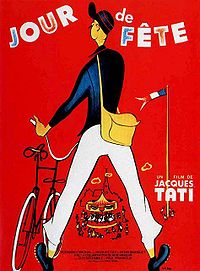
JOUR DE FETE
France, 1947, 76 minutes, Black and white/Colour.
Jacques Tati.
Directed by Jacques Tati.
Jour de Fete is a comedy by Jacques Tati. While he had written and acted in some films in the 1930s, his breakthrough in France as well as internationally came with this film.
The film is a portrait of a simple postman, who is teased by the people in the village but does not recognise it. When they make him drunk on a feast day and get him to watch a film about American postal delivery methods, he tries them out himself – with little more success than his teasing friends anticipated. His attempts provide an opportunity for Tati’s particular brand of comedy, gentle satire, slapstick satire – often wordless. Tati himself was a master of mime.
After this he went on to make a number of classics: M’sieur Hulot’s Holiday, Mon Oncle, Playtime, Traffic.
Jour de Fete was made with a particular colour process, Thomson Colour, which went out of use before the film was released. Tati’s daughter restored Jour de Fete to its original colour during the 1990s when the film was re-released.
1. The quality of Jacques Tati's comedy? This film as showing its origins, the French tone and style, social awareness and observation, the humour concerning the individual as well as the group, the focus on humorous situations and their detail, visual jokes? The quality and strength of the observation, the good-natured observation as well as the mirroring of folly? The appeal of this film?
2. The quality of the film as a first feature, the skill in direction, photography, editing, the acting? Its capacity to entertain over the decades?
3. Black and white photography, the atmosphere of the village of St. Severe? The people, the way of life, day and night, the day of the fair, the aftermath? The animals and their being symbols for the people? The editing and the pace and the technical flair of the film?
4. The presentation of the town itself, the audience being able to identify characters and situations, identifying with them? The structure of the setting up of the fair, the day of enjoyment, the involvement of the postman and his being the centre of attention, the aftermath in the evening and the packing up of the fair? The audience participating in the day? The old lady and the goat and her observations, her recurring presence and its significance? The cafe and the wet paint, the proprietor and his reactions to people, the showmen and their setting things up, the conduct of the fair, eyeing the girl on the balcony? The shooting galleries, the merry-go-round? The postman and his assistant within this context? How pleasant an observation of a short time in a French provincial town?
5. How accurate the portrait of the people, seeing them at work, enjoying themselves, happy, angry, cranky, drunk etc.?
6. Jacques Tati's performance as Francois? His first appearance as postman, his bike, going into the cafe and out again? His awkwardness, sighs? How funny a character, what was being mocked in his portrayal, yet the hero of the film?
7. Francois as the postman, his work, his bike and all the comedy with the bike as a machine to be ridden and to be fought with, humorous incidents such as his saluting? A strong personality while awkward, kindly?
8. The humour at the expense of the United States with the presentation of the postman in America? The humorous usage of film footing with the dubbed- commentary about the post? What was the film saying about America, the contrast with Europe? The spectacular aspects of America, speed?
9. Francois and his watching the film, everybody's comments and the effect that they had? The irony of this?
10. How effective was the filming of the night sequence - Francois in the cafe, drinking? Ten minutes of the film taken up with the night sequence with the comedy and the bike?
11. The change of atmosphere with the next day, Francois waking up with the train, his humorous emulating of American efforts? The portrait of the post office, the sorting the letters on the back of the truck, his speed, delivery? The visual humour of the long sequence of his delivering the mail and its culmination in the river?
12. How valuable is this kind of observation of human beings? Gentle mockery? Gentle self-acceptance through humour?